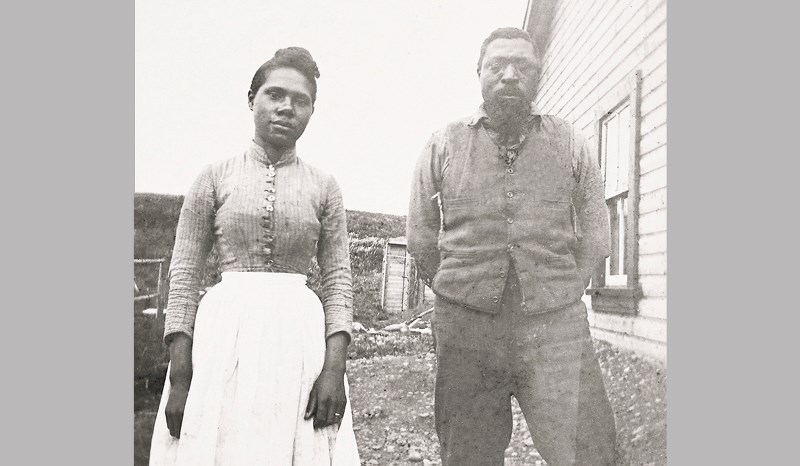From slave in the southern U.S. to respected cowboy and pioneer in Alberta’s early ranching days, John Ware’s life was a remarkable one.
However, despite reaching folk-hero status, the story of the one-time Millarville area rancher’s life is still not well known in the province, and it’s even less well-known in the rest of Canada, said writer and director Cheryl Foggo.
It’s something she hopes to change with her documentary John Ware Reimagined, which is currently in production with the National Film Board.
Ware is a figure of national importance, she said.
“We’re very poor at acknowledging our own history and we’re doubly poor at acknowledging the histories of people that are not connected to our European heritage,” said Foggo.
Ware was born into slavery in South Carolina sometime around 1845. After the American Civil War, Ware travelled to Texas where he honed his skills as a cowboy.
He was employed driving cattle herds north into Wyoming and Montana territories and was hired in 1882 to bring 3,000 head of cattle to the Northwest Cattle Company Ranch, better known as the Bar U Ranch. Ware went on to work at the Bar U and then the Quorn Ranch along the Sheep River before starting his own operation in the Millarville area.
Ware became renowned for his skill as a cowboy and horseman, his physical strength, courage and kindness.
In 1900, Ware moved his family to a new ranch site near the Red Deer River north of Brooks. Ware’s wife Mildred died of pneumonia in April 1905 and Ware died in September of that same year when his horse tripped and fell on him after stepping in a badger hole. Stories of his funeral say it was one of the largest held in Calgary to that point.
The seeds of Foggo’s documentary were planted during the Calgary Stampede’s 100th anniversary in 2012. Though Ware was not around for the first Stampede in 1912, she said he knew many involved and he was instrumental in creating the culture it celebrated.
Foggo started by writing a theatrical play called John Ware Reimagined that debuted in Calgary in 2014. Her work on the play led her to consider a documentary on Ware’s life.
“It’s been a very long time since a major investigation of John Ware’s life happened,” she said. “Really, there hasn’t been anything new since 1960 when Grant MacEwan published John Ware’s Cow Country.”
Filming began last year.
Some scenes have been shot in the Foothills, at the Bar U Ranch National Historic Site and at the location of Ware’s former Millarville ranch. In the film, Ware is portrayed by champion calf roper Fred Whitfield.
While his strength and horsemanship dominate many tales about him, Foggo said Ware was also an innovator in farming and ranching. She said he was an early adopter of irrigation and other farm techniques.
Through her research, Foggo said she was surprised by just how many lives Ware touched and how many people he helped.
“It was finding those anecdotes that are in the various small community memoirs… there are hundreds of those records that exist and John Ware appeared frequently and the stories in general are not about his legend, what the stories are about is a kindness he extended or him going out of his way to help someone.”
Ware overcame several of the challenges early ranchers and settlers did, but Foggo said he had to do it while facing racism.
“It was quite a balancing act that he had to do and he did face adversity, challenges and racism,” she said. “He faced some of the same adversity and challenges as every other rancher but he had additional ones because of his race.”
Foggo said the film is also an exploration of black history in Alberta and Ware’s place in it.
She said Ware is not a lone figure in Alberta’s Black history; he’s a part of a larger story about the black community in early years of settlement in western Canada. Though black settlers may have found homes in different parts of Alberta or Saskatchewan, she said they were part of the same community.
Foggo said she is creating a connection between Ware’s life and the attitudes he influenced and the arrival in of her own ancestors in western Canada in 1910.
“That’s what I’m doing is creating a context that links John Ware’s life and times to the life and times of other black people that were here, as I said, during, before and after his time and then connect it to the large migration, this 1910 migration,” she said.
Working with director of photography Douglas Munro and his wife Margot McMaster, the film’s editor, (both Millarville-area residents) Foggo hopes to have the film finished later this year.
A launch date hasn’t been set, but she expects it will be in 2019.
The NFB is interested in bringing the film to the communities that have helped keep Ware’s story alive and local screenings in one or more Foothills locations is possible, said Foggo.
“I’m really looking forward to sharing the film with the descendants of John Ware’s neighbours and other people who have been involved in cherishing his legacy and keeping it alive,” she said.




